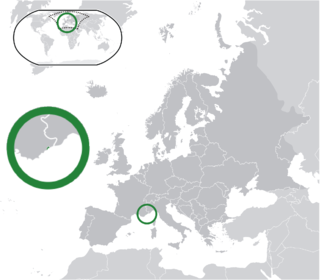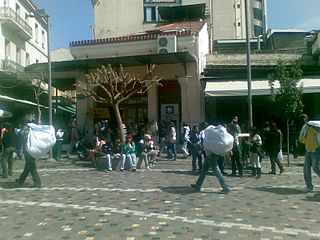Related Research Articles

The Politics of Benin take place in the framework of a presidential representative democratic republic, wherein the President of Benin is both head of state and head of government, and of a multi-party system. Executive power is exercised by the government. Legislative power is vested in both the government and the legislature. The Judiciary is independent of the executive and the legislature. The current political system is derived from the 1990 Constitution of Benin and the subsequent transition to democracy in 1991. The Economist Intelligence Unit rated Benin a "hybrid regime" in 2019.
Emigration is the act of leaving a resident country or place of residence with the intent to settle elsewhere. Conversely, immigration describes the movement of people into one country from another. A migrant emigrates from their old country, and immigrates to their new country. Thus, both emigration and immigration describe migration, but from different countries' perspectives.

Free migration or open immigration is the position that people should be able to migrate to whatever country they choose with few restrictions.

The Melilla border fence forms part of the Morocco–Spain border in the city of Melilla, one of two Spanish cities in north Africa. Constructed by Spain, its stated purpose is to stop illegal immigration and smuggling. Melilla's border and its equivalent in Ceuta, also bordering Morocco, are the only two land borders between the European Union and an African country.

Friedrich "Fritz" Pfeffer was a German dentist and Jewish refugee who hid with Anne Frank and her family during the Nazi occupation of the Netherlands. He perished in the Neuengamme concentration camp in Northern Germany. Pfeffer was given the pseudonym Albert Dussel in Frank's diary, and remains known as such in many editions and adaptations of the publication.
Immigration to Germany, both in the country's modern borders and the many political entities that preceded it, has occurred throughout the country's history. Today, Germany is one of the most popular destinations for immigrants in the world, with well over 1 million people moving there each year since 2013. As of 2019, around 13.7 million people living in Germany, or about 17% of the population, are first-generation immigrants.
As of 2019, Canada has the eighth largest immigrant population in the world, while foreign-born people make up about one-fifth of Canada's population—one of the highest ratios for industrialized Western countries.
Canadian immigration and refugee law concerns the area of law related to the admission of foreign nationals into Canada, their rights and responsibilities once admitted, and the conditions of their removal. The primary law on these matters is in the Immigration and Refugee Protection Act, whose goals include economic growth, family reunification, and compliance with humanitarian treaties.

The history of the Jews in Monaco goes back at least a century, most notably to the time of the Holocaust. Monaco had a very small Jewish presence before World War II, numbering approximately 300 people. During the war, the principality's government issued false identity papers to its Jewish residents to protect them from Nazi deportation. Prince Louis II refused to dismiss Jewish civil servants and protected Édouard de Rothschild from deportation. However, Monaco's police arrested and turned over 42 Central European Jewish refugees to the Nazis. 60 Jews were arrested Aug 27–28 in 1942, and 90 in total, according to "The Algemeiner".
Opposition to immigration, also known as anti-immigration, has become a significant political ideology in many countries. In the modern sense, immigration refers to the entry of people from one state or territory into another state or territory in which they are not citizens. Illegal immigration occurs when people immigrate to a country without having official permission to do so. Opposition to immigration ranges from calls for various immigration reforms, to proposals to completely restrict immigration.

Illegal immigration is the migration of people into a country in violation of the immigration laws of that country or the continued residence without the legal right to live in that country. Illegal immigration tends to be financially upward, from poorer to richer countries. Illegal residence in another country creates the risk of detention, deportation, and/or other sanctions.

Immigration to Greece percentage of foreign populations in Greece is 7.1% in proportion to the total population of the country. Moreover, between 9 and 11% of the registered Greek labor force of 4.4 million are foreigners. Migrants additionally make up 25% of wage and salary earners.

An open border is a border that enables free movement of people between jurisdictions with no restrictions on movement and is lacking substantive border control. A border may be an open border due to intentional legislation allowing free movement of people across the border, or a border may be an open border due to a lack of legal controls, a lack of adequate enforcement or adequate supervision of the border. An example of the former is the Schengen Agreement between most members of the European Economic Area. An example of the latter has been the border between Bangladesh and India, which is becoming controlled. The term "open borders" applies only to the flow of people, not the flow of goods and services, and only to borders between political jurisdictions, not to mere boundaries of privately owned property.

The history of the Jews in Zambia goes back to the early 1900s. Jews were always a small community with a notable role in Zambian history. The history of the Jews in Zambia dates to 1901 when it was still under British Colonial rule. Northern Rhodesia was colonized in the 1890s by the British South Africa Company, otherwise known as BSAC. Initially, Northern Rhodesia was split into North-eastern and North-western Rhodesia. However, the BSAC united them in 1911 to form Northern Rhodesia, which has its capital in Livingstone, near Victoria Falls. Among the population of 1 million people, there were 1,500 white residents in Northern Rhodesia, of whom many were the Jewish settlers. Northern Rhodesia became under British Colonial Rule partially so that the British Government could increase the number of white individuals and settlers in the country, which would contribute to a wider strategy to increase the influence that the British has between Kenya and South Africa. The Jewish settlers were one of the dominant ethnic groups and became highly involved in local politics, with prominent Jewish figures driving the push for Zambian independence and African nationalist rhetoric. Northern Rhodesia’s fertile land, World War II, and independence from the British Colonial rule all had a profound impact on both immigration and emigration of Jewish refugees. The Jewish diaspora introduced trade and commerce into the region in both regional and urban areas through cattle trading, ranching, mining, communication networks, storefronts, transport, and butchery, amongst others. The Jewish settlers, whether they are Jewish through origin, birth, marriage, or confession, all formed a small, yet strong community. The Jews in Zambia were a Jewish diaspora cultural and religious settler minority group, which raises concerns about the notion of who is the coloniser, who is the colonised, who is the victim and who is the oppressor. This deems that it can be studied through a postcolonial framework. Following Zambia's independence in 1964, there was a large exodus of Jews and white individuals from the country. In 2022, there remains less than fifty Jews in Zambia.
LGBT migration is the movement of lesbian, gay, bisexual, transgender, and queer (LGBT) people around the world and domestically, often to escape discrimination or ill treatment due to their sexuality. Globally, many LGBT people attempt to leave discriminatory regions in search of more tolerant ones.

The 2015 European migrant crisis, also known internationally as the Syrian refugee crisis, was a period of significantly increased movement of refugees and migrants into Europe in 2015, when 1.3 million people came to the continent to request asylum, the most in a single year since World War II. Those requesting asylum in Europe in 2015 were mostly Syrians, but also included significant numbers of Afghans, Nigerians, Pakistanis, Iraqis and Eritreans, as well as economic migrants from the Balkans.
Poetical Refugee is a 2001 French drama film directed by Abdellatif Kechiche, starring Sami Bouajila, Élodie Bouchez and Bruno Lochet. It was Kechiche‘s debut feature film and was awarded the Luigi De Laurentiis Award at the Venice Film Festival for best first film, winning seven awards, overall, at different film festivals.
Sylvestre Amoussou is a Beninese actor turned film director, best known for his 2006 film Africa Paradis, a satire on immigration.
"Refugees as weapons", or "Weapon of Mass Migration" is a term used to describe a hostile government organizing, or threatening to organize, a sudden influx of refugees into another country with the intent of overwhelming its borders or causing political discomfort. It often exploits the targeted country's humanitarian obligations to take in refugees and hear their asylum claims. The responsible country usually seeks to extract concessions from the targeted country and achieve some political, military, and/or economic objective.
Externalization is efforts by wealthy, developed countries to prevent asylum seekers and other migrants from reaching their borders, often by enlisting third countries or private entities. Externalization is used by Australia, Canada, the United States, the European Union and the United Kingdom. Although less visible than physical barriers at international borders, externalization controls or restrict mobility in ways that are out of sight and far from the country's border. Examples include visa restrictions, sanctions for carriers who transport asylum seekers, and agreements with source and transit countries. Consequences often include increased irregular migration, human smuggling, and border deaths.
References
- ↑ "Screening of 'Africa Paradis' in presence of Beninese Actor and Director Sylvestre Amoussou". Africavenir. 25 November 2012. Retrieved 4 September 2016.
- ↑ Frank, Alison (21 November 2011). "A Step Forward: New African Film in Paris". The Moving Arts Film Journal. Archived from the original on 14 September 2016. Retrieved 4 September 2016.